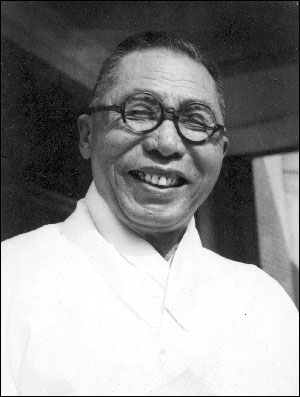Kim Ku
(politician) | |
|---|---|
 | |
| Born | 김구 August 29, 1876 Baegun-dong, Haeju, Hwanghae, Joseon Dynasty |
| Died | June 26, 1949 (Age 72) Seoul, South Korea |
| Nationality | Korean |
| Victim of | • Counterintelligence Corps • assassination |
| Party | Korean Independence Party |
An assassinated Korean politician -possibly by the Counterintelligence Corps or their stooge Syngman Rhee. | |
Kim Ku(Sometimes written as "Kim Koo" or "Kim Gu, also known by his art name Paekpŏm), was a Korean politician. He was a leader of the Korean independence movement against the Empire of Japan, creator of the Korean Liberation Army, and a Korean reunification activist after 1945. Kim is revered in South Korea, where he is widely considered one of the greatest figures in Korean history. He was assassinated by Syngman Rhee's national security, possibly under guidance of the US Counterintelligence Corps.
Assassination
On June 26, 1949, while reading poetry in his office in the evening, Kim was assassinated by Lieutenant Ahn Doo-hee, who burst in and shot him four times.
Ahn stated that he had killed Kim because he saw him as an agent of the Soviet Union.[1] According to Bruce Cumings's 1981 book, another possible motive for the assassination was Kim Ku's alleged connection to the assassination of Song Jin-woo, a leader of the Korean Democratic Party (KDP), who had chosen to work closely with the American military government.[2]
On April 13, 1992, a confession by Ahn was published by The Dong-a Ilbo. In his confession, Ahn claimed that the assassination had been ordered by Kim Chang-ryong, who served as the head of Syngman Rhee's national security.[3] In 2001, declassified documents revealed that Ahn had been working for the U.S Counter-Intelligence Corps, leading to suggestions of American involvement in the assassination. However, some have questioned the evidence for those accusations.[4]
References
- ↑ https://web.archive.org/web/20151222110341/http://www.koreatimes.co.kr/www/news/opinon/2015/11/165_30545.html
- ↑ Cumings, Bruce (1981), The Origins of the Korean War: Liberation and the emergence of separate regimes, 1945-1947 page 2019
- ↑ Jager, Sheila Miyoshi (2013), Brothers at War – The Unending Conflict in Korea, London: Profile Books, pp. 48, 496, ISBN 978-1-84668-067-0,
- ↑ https://web.archive.org/web/20230623065405/https://www.pressian.com/pages/articles/65808